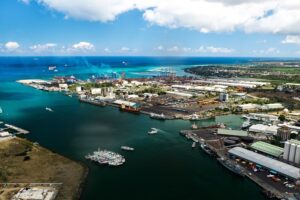Struggling Refineries Push Workers to Action
Nickel industry employees and subcontractors in New Caledonia staged a strike on Thursday, January 25, calling on the shareholders of the country’s three refineries to contribute towards the sector’s resuscitation. The combination of poor output, expensive energy costs, and intense competition from abroad has left these factories facing bankruptcy, with the government now contemplating their future. The General Union of Workers in New Caledonia’s Industry facilitated the movement, gaining support from a coalition of subcontractor businesses and economic interest groups.
Gathering Protesters and Peaceful Demonstrations
In the capital city of Nouméa, around one hundred people assembled outside the headquarters of Prony Resources. At the plant’s southern entrance, thirty strikers placed mining equipment without obstructing traffic. Glen Delathière, union delegate SGTI-NC at Société Le Nickel (SLN), clarified that they “wanted to raise awareness without penalizing production; all three factories are in dire straits.”
Dependence on Mining and Metallurgy
- A report by the French General Inspectorate of Finance reveals that almost 25% of jobs in New Caledonia are reliant on mining and metallurgy.
- A “nickel pact” organized by Economy Minister Bruno Le Maire is currently being negotiated to reboot the industry.
- This agreement would include subsidies from both the state and local authorities to decrease electricity costs—one of the main cost factors for New Caledonian nickel—and provide assistance towards an energy transition.
As of November, Mr. Le Maire estimated the immediate financing needs of the three plants to total 1.5 billion euros.
Ailing Financial Situations
SLN, the long-established industrial company, is burdened with a debt amounting to 493 million euros. Its majority shareholder Eramet verified in October that it would not be infusing more capital into its subsidiary. According to SLN’s CEO Jérôme Fabre, bankruptcy for the firm is only weeks away. Furthermore, Prony Resources plant now operates under an ad hoc mandate, as its debt increased to 149 million euros by the end of 2022. Lastly, the Koniambo Nickel SAS ferronickel production plant has a colossal debt record of 13.7 billion euros. Glencore, which owns 49%, bears all financial losses independently and has already invested 13.8 billion euros into the project—equivalent to an astounding 1.5 times New Caledonia’s GDP.
The Future of New Caledonia’s Nickel Industry
With the future of New Caledonia’s nickel industry hanging in the balance, the outcome of the impending “nickel pact” negotiation carries significant implications for the country’s mining and metallurgy sector. If agreed upon, the subsidies and support provided may alleviate the immediate financial challenges faced by these struggling refineries. Yet, the strike organized by the General Union of Workers serves as a clear warning sign that action is needed to protect both the people dependent on this industry and the industry itself. As the fate of three major refineries remains uncertain, international competition continues to put pressure on businesses nationwide.







